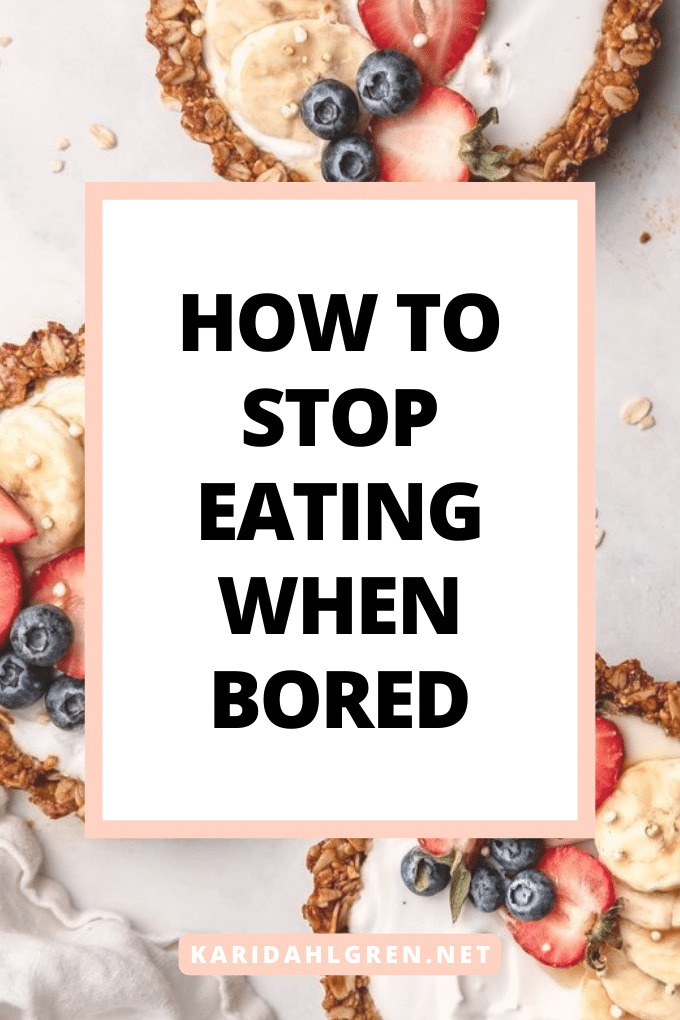
Staying occupied is not a long-term solution for learning how to stop eating when bored. Many of us already know this, though. We’ve witnessed first-hand that forcing ourselves to watch a different show on Netflix isn’t compelling enough to stop the urge to reach for food out of boredom.
Why is boredom so hard to tolerate? What makes us feel such a strong pull to keep ourselves occupied with food and flavor even if we strongly desire to stop overeating? To answer these questions, I dug into both clinical evidence and my own experience as both a coach and someone that has personally climbed out of the pit of compulsive eating.
Please note: I am not saying that I never overeat, as even the most diligent eaters in the world don’t achieve “perfect eating.” What I am saying, though, is that I no longer feel pulled to the pantry whenever I’m bored, and it’s a relief. The following tips will help you learn how to stop eating when bored, too.
Understanding Boredom Eating: It’s More Complex Than It Seems

If you struggle with eating when you’re bored, you’re not alone. It has been identified as one of the most common triggers for emotional eating.[1] Although it is common, boredom eating is also complex. Unlike eating driven by physical hunger, boredom eating stems from an emotional desire—a desire that is more layered than it seems.
In a fascinating study, researchers exposed participants to a monotonous task and presented them with one of two options: free access to candy or free access to electrical shocks (self-administered, of course). It is no surprise that participants ate more candy when bored.[2]
What was surprising, however, is that people were also more likely to self-administer electric shocks compared to those engaged in a neutral task.
That’s right—we would rather shock ourselves than feel bored.
These findings suggest that boredom eating is primarily motivated by a desire to escape monotony rather than seeking pleasure (“hedonic eating”). Boredom eating is about feeling positive or negative emotion instead of boredom.[3] With all this said, why do we hate boredom so much?
Boredom as a Secondary Emotion in Eating Psychology
The preference for electrical shocks over enduring boredom unveils profound insight into eating psychology. It shows that boredom is not just a simple lack of engagement or interest but instead a secondary emotion.
Just like an iceberg, a secondary emotion is the obvious part above the surface while the primary emotion is the bigger portion hidden beneath the surface.
![the emotion iceberg. secondary emotion: boredom [pointing to top of iceberg] primary emotions: fear, sadness, hurt, loneliness, anxiety, etc. [pointing to bottom of iceberg]](https://karidahlgren-net.b-cdn.net/wp-content/uploads/2023/11/eating-when-bored-emotion-iceberg.png)
In both my personal experience overcoming compulsive eating (including boredom eating) and coaching others through the same, I’ve found that the primary emotion underneath boredom is usually some type of fear. It could be the fear of missing out or the fear of falling behind—it’s unique to everyone.
Though this is my personal theory, I can also back it up with science as researchers found that people who eat in response to boredom are likely to have greater challenges in managing their emotions.[4], [5] With that said, perhaps boredom eating is the most common type of emotional eating because we don’t yet have the awareness necessary to articulate other emotions.
After all, emotional awareness is not taught in school, and we are unlikely to harness this skill without sufficient practice. Therefore, learning how to stop eating when bored isn’t just about managing dietary habits—it’s about enhancing emotional awareness and regulation through practice.
Practical Strategies to Address Boredom Eating
With boredom eating being the most common and prevalent form of emotional eating, it makes an abundance of sense to address it through emotions. Instead of using surface-level tactics like “trying to stay occupied,” let’s address the root cause.
Here are some tried-and-true steps for learning how to stop eating when bored:
1. Develop Emotional Awareness with the Stop, Drop, & Feel® Method
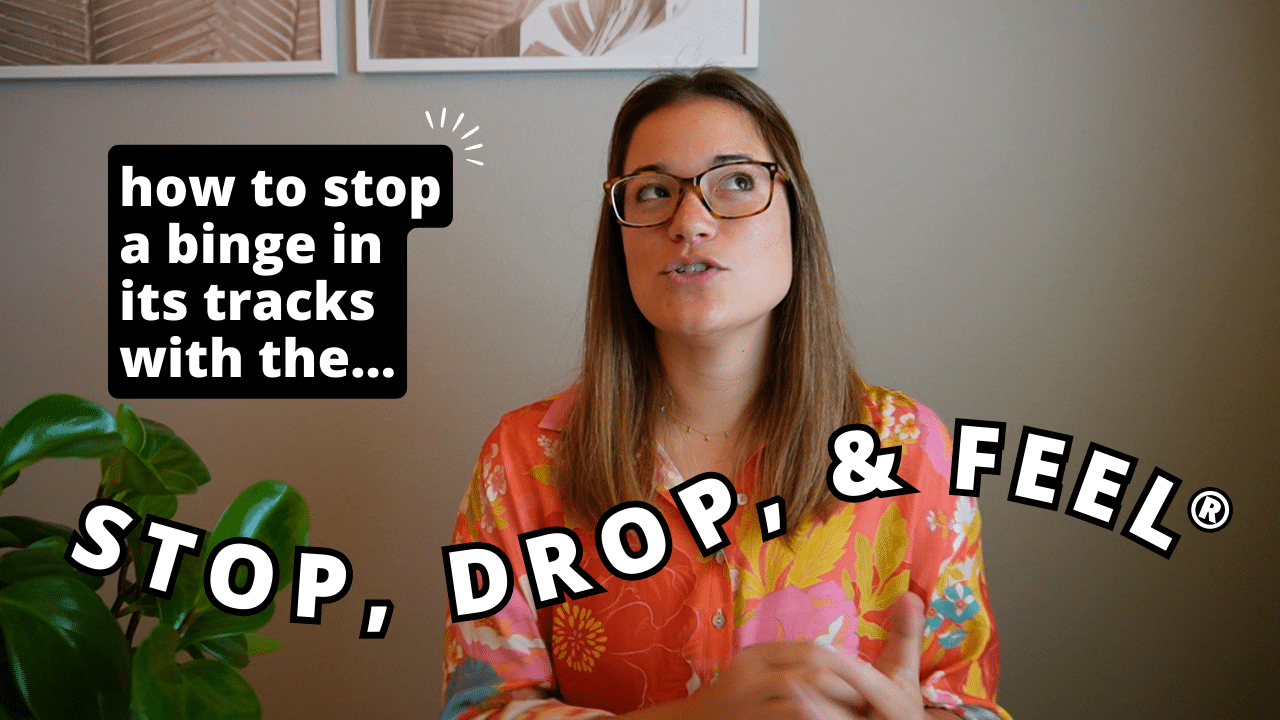
To navigate the complex waters of boredom eating, the first step is developing emotional awareness. You need to develop skill with identifying the primary emotion behind your boredom. This process begins with my Stop, Drop, & Feel method, a tool for delving into your internal emotional landscape.
The next time you feel the urge to eat out of boredom, stop for a moment and step back from the automatic response. Then, drop into your body and mind, tuning into the sensations and emotions present. Finally, feel what’s really there beneath the boredom.
At first, you might not be able to articulate anything besides boredom, and that’s okay! Emotional awareness takes time to develop. Focus on staying open and curious about your emotions, and let the process unfold over time.
2. Cultivate Emotional Tolerance through Consistent Practice
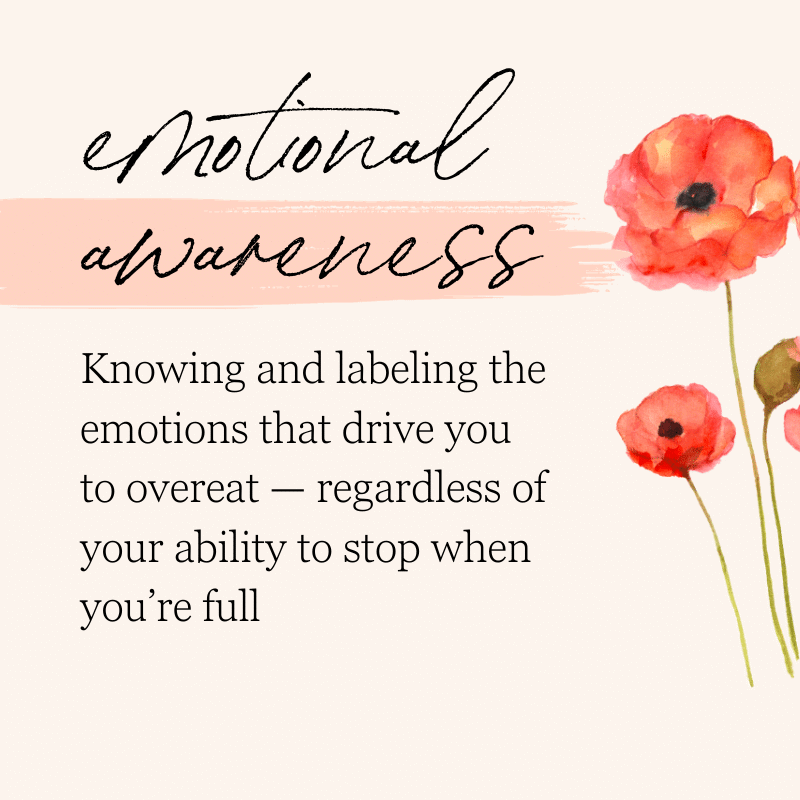
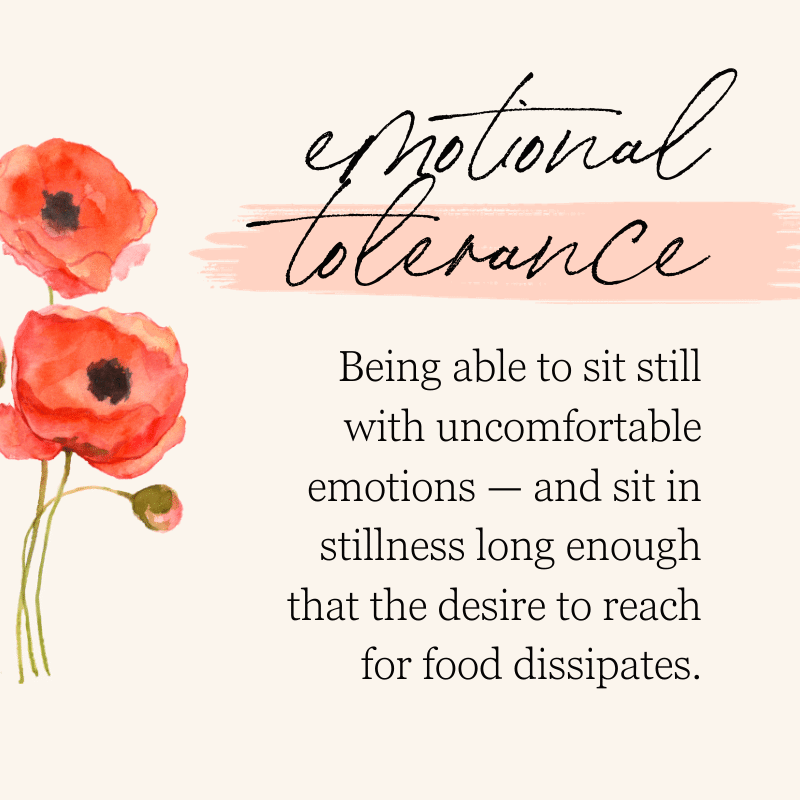
While emotional awareness is the ability to articulate your emotions, emotional tolerance is your ability to sit still with difficult emotions—including boredom and especially the primary emotions underneath.
The journey towards emotional tolerance is built through consistent practice of the Stop, Drop, & Feel method. Just like any skill, emotional tolerance requires regular practice. Each time you feel bored and the urge to eat arises, use the SDF method.
At first, you may not be able to identify anything other than boredom; but over time, you’ll discover what’s underneath and learn to sit with discomfort without suppressing it with food. It’s about recognizing that discomfort is a transient part of the human experience, and when we embrace it instead of resisting it, it helps curb the desire to eat when bored.
3. Find Alternative Coping Mechanisms for Boredom
As you work on developing emotional awareness and tolerance, it’s helpful to have alternative coping mechanisms for eating when bored. These alternatives can be activities that engage you in a fulfilling and meaningful way, diverting your attention from the urge to eat.
It could be a hobby, physical activity, or even a “mindless” activity like Netflix. The key is to find activities that provide a sense of satisfaction so that you’re less likely to seek satisfaction through food. Keep in mind that “staying occupied” is merely a coping mechanism and does not help stop boredom eating long-term.
Staying occupied is merely a Band-Aid. It keeps you separated from your feelings instead of in tune with them. While I encourage you to work on delving into your emotions, we are all human and we all have bad days. Coping mechanisms can be helpful and even necessary as you work on developing emotional awareness and tolerance.
To inspire you to approach your boredom differently, I dug up an article that I read almost eight years ago about boredom being the “last privilege of a free mind.” Back in 2015, the author Gayatri Devi wrote:
"But boredom is not tragic. Properly understood, boredom helps us understand time, and ourselves. Unlike fun or work, boredom is not about anything; it is our encounter with pure time as form and content...
So lean in to boredom, into that intense experience of time untouched by beauty, pleasure, comfort and all other temporal salubrious sensations. Observe it, how your mind responds to boredom, what you feel and think when you get bored. This form of metathinking can help you overcome your boredom, and learn about yourself and the world in the process.
Don’t replace boredom with work or fun or habits. Don’t pull out a screen at every idle moment. Boredom is the last privilege of a free mind."Gayatri Devi
I remember this article from over eight years ago because it inspired me to commit myself to tolerating some boredom in my life and trying not to reach for my phone at every idle moment. That said, I also think it’s important not to shame ourselves out of our coping mechanisms!
We can’t jump straight from boredom eating completely mastering how to stop eating at fullness. There has to be grace in between, during the moments when our emotional tolerance is spent and we just need something to take the edge off.
Speaking of taking the edge off…
How to Deal with “Plain Boredom” vs “Edgy Boredom”
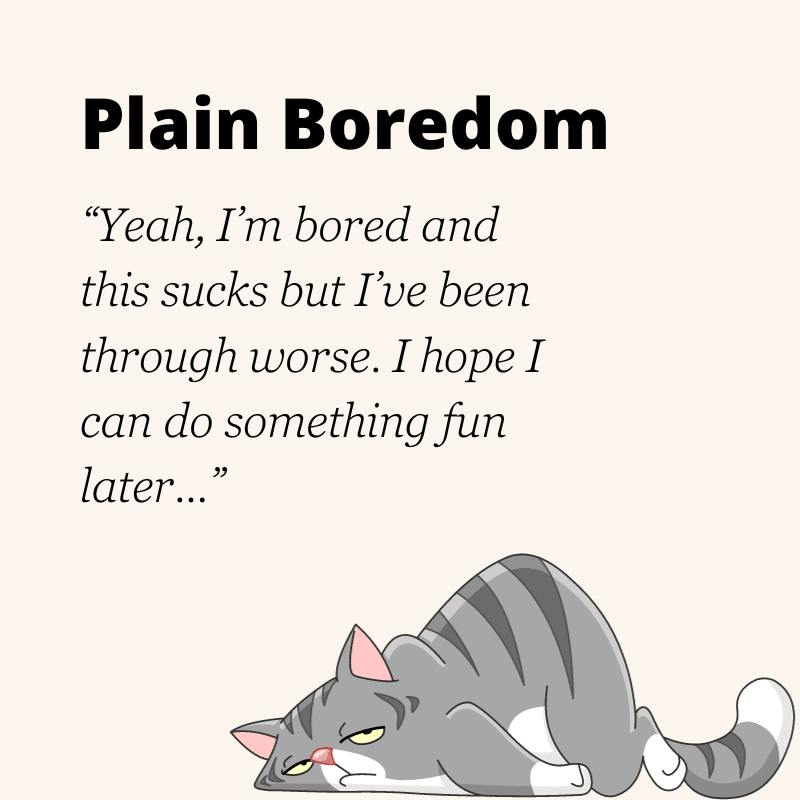
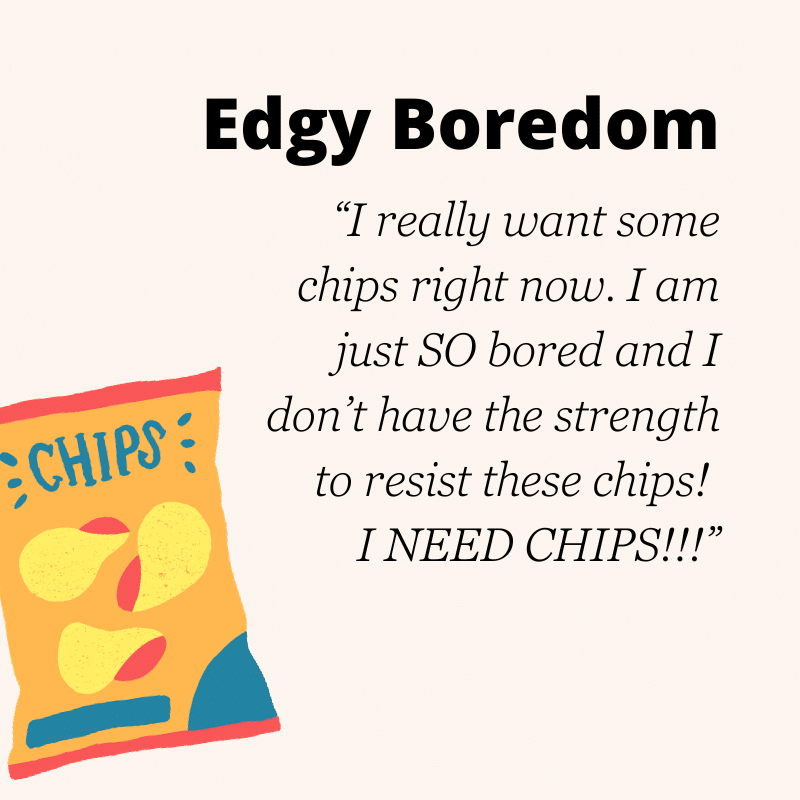
On the path to stopping boredom eating, it’s vital to distinguish between what I term as “plain boredom” and “edgy boredom.” This distinction is key to understanding why, despite often possessing above-average willpower, many of us still find ourselves trapped in the cycle of compulsive eating.
“Plain boredom” is the garden-variety feeling of not being engaged or entertained. It’s a lackluster state where time drags, and we feel uninspired. Most people think that this is the boredom that drives them to the pantry or fridge.
However, I firmly believe that compulsive eaters possess more than sufficient willpower to handle plain boredom. Why? Because we’ve spent years and years restricting our diet and flexing the muscle of willpower. Even though it doesn’t work because we cannot strongarm our body’s biological reaction to restriction,[6] we still strengthen our willpower nonetheless.

The issue isn’t a lack of willpower; it’s that we’re often dealing with something much more complex than plain boredom. Enter: “edgy boredom.” This is where boredom is laced with underlying emotions—emotions that are edgier, sharper, more uncomfortable. It could be anxiety, a deep-seated fear of missing out, or an underlying sense of loneliness or sadness.
These emotions are the hidden currents beneath the calm surface of boredom. It’s this “edgy boredom” that overwhelms our willpower and pushes us towards food for numbness or comfort.
Remember those studies I mentioned earlier? We don’t care whether we gain pleasure through yummy foods (eating the candy) or feel pain (shocking ourselves with electricity)—we just want the boredom to stop.
Recognizing when you’re experiencing edgy boredom is crucial. It’s your sign to employ the Stop, Drop, & Feel method. When we start to feel the pull to eat when bored, it’s often not hunger but these underlying emotions seeking attention.
Stopping Boredom Eating
You have more than enough strength to handle “plain boredom” on your own; and when “edgy boredom” comes knocking, you know what to do: Stop, Drop, & Feel. This is how I stopped compulsive eating. It was the hardest thing I ever did, sitting still with my edgiest emotions.
I once thought that I just ate out of boredom too, but as soon as I started practicing the Stop, Drop, & Feel, I quickly learned that I had a mountain of pain underneath. But once I got better at feeling bad and letting that be okay, my desire to eat when bored—and desire to overeat in general—greatly diminished.




Hi Kari!
Lately – these past few weeks – compulsive eating has gotten the best of me. I will practice your Stop, Drop, & Feel. But right now, it’s midnight where I am and I feel so full 🙄😕 and tomorrow will be another day for eating and I won’t feel hungry at all … and then I’ll binge again in the afternoon and/or the evening because I wasn’t hungry in the AM …. How do I break this cycle of ‘binge in the later afternoon, don’t/can’t eat in the AM the next day (too full), binge in the later afternoon again’?
Thank you!
JoEllen
Hi JoEllen!!! I feel you. I feel you sooo much. The idea of eating breakfast the morning after overeating can spark a lot of fear around weight gain, because aren’t we supposed to only eat when we’re hungry? But I wonder how you would feel by eating breakfast anyway. I do have another blog post on a related topic that you might enjoy as well: If I overeat one day should I undereat the next?
Ultimately, if you feel too afraid to eat breakfast even when you aren’t hungry, focus only on the Stop, Drop, & Feel until you feel yourself gaining courage. Let me know if this resonates or not; happy to keep helping!
I signed up for “The Spiritual Seekers’s Guide to Stop Binge Eating” but never received it, although I did get the 5 daily newsletters. Can the Guide be sent to me?
I’ve been reading your blog and watching your videos. I find them very interesting.
Thanks so much.
Hi Marge! I’m glad you enjoy my blog and videos! Thanks for watching. And your ebook is on the way 🙂